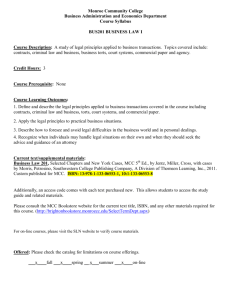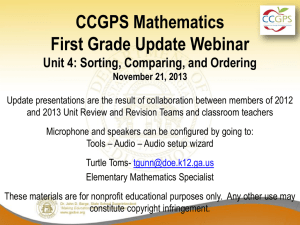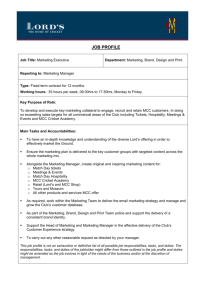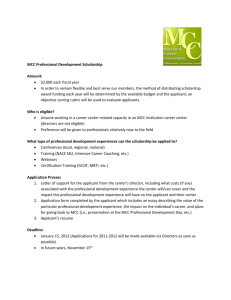Student E-mail Policy
advertisement
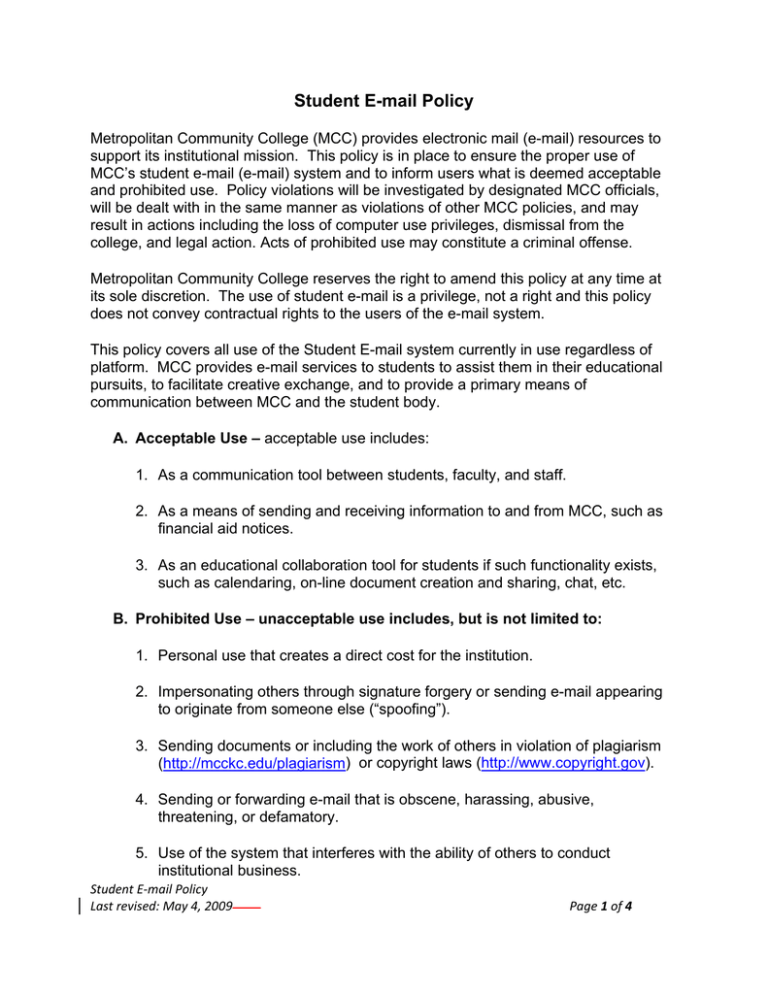
Student E-mail Policy Metropolitan Community College (MCC) provides electronic mail (e-mail) resources to support its institutional mission. This policy is in place to ensure the proper use of MCC’s student e-mail (e-mail) system and to inform users what is deemed acceptable and prohibited use. Policy violations will be investigated by designated MCC officials, will be dealt with in the same manner as violations of other MCC policies, and may result in actions including the loss of computer use privileges, dismissal from the college, and legal action. Acts of prohibited use may constitute a criminal offense. Metropolitan Community College reserves the right to amend this policy at any time at its sole discretion. The use of student e-mail is a privilege, not a right and this policy does not convey contractual rights to the users of the e-mail system. This policy covers all use of the Student E-mail system currently in use regardless of platform. MCC provides e-mail services to students to assist them in their educational pursuits, to facilitate creative exchange, and to provide a primary means of communication between MCC and the student body. A. Acceptable Use – acceptable use includes: 1. As a communication tool between students, faculty, and staff. 2. As a means of sending and receiving information to and from MCC, such as financial aid notices. 3. As an educational collaboration tool for students if such functionality exists, such as calendaring, on-line document creation and sharing, chat, etc. B. Prohibited Use – unacceptable use includes, but is not limited to: 1. Personal use that creates a direct cost for the institution. 2. Impersonating others through signature forgery or sending e-mail appearing to originate from someone else (“spoofing”). 3. Sending documents or including the work of others in violation of plagiarism (http://mcckc.edu/plagiarism) or copyright laws (http://www.copyright.gov). 4. Sending or forwarding e-mail that is obscene, harassing, abusive, threatening, or defamatory. 5. Use of the system that interferes with the ability of others to conduct institutional business. Student E‐mail Policy Last revised: May 4, 2009 Page 1 of 4 6. Use of the system in violation of any law, regulation, or public or MCC policy. 7. Unauthorized access to or transmission of e-mail accounts of others or attempting to breach system security measures. 8. Knowingly transmitting e-mail messages that contain computer viruses, Trojan horses, corrupted files, hoaxes, worms, spyware or any form of malware. 9. Use of the system for commercial purposes or personal financial gain. 10. Representing oneself as an agent of the institution or making statements on behalf of the institution. 11. Use of the system in any manner that could cause, directly or indirectly, excessive strain on computing systems or others’ use of e-mail services or systems. 12. Transmitting another’s intellectual property or proprietary information without the express written consent of the owner. 13. Use of the system to conduct, promote or encourage illegal activity. 14. Providing a third party with an individual’s e-mail address or a list obtained from within the institutional system without express written permission. C. Termination of Service will occur as follows: 1. Suspicious activity – once a report of violation has been received and a recommendation by the Dean of Students has been made, the e-mail account will be immediately disabled pending the outcome of the investigation. The investigation will be conducted in accordance with the Student Code of Conduct (http://mcckc.edu/conduct) as expeditiously as possible. Should an e-mail account be disabled, a copy of any requested academic information in the account will be provided to the student. 2. Students who are expelled – access to e-mail accounts will be terminated immediately. The e-mail account will be deleted one month after expulsion date. New mail cannot be accessed during this period. Requests for copies of e-mail and e-mail system contents must be made to the Campus Dean in writing within 10 days following the expulsion date. Upon the request of the Campus Dean, institutional IT staff may be granted access to the mailbox to provide the information requested. Student E‐mail Policy Last revised: May 4, 2009 Page 2 of 4 3. Students who leave prior to graduating – e-mail accounts will remain active. The student is responsible for making backup copies of their MCC student email after their official withdrawal date. 4. Graduated students – e-mail accounts will remain active. The student is responsible for making backup copies of their MCC student e-mail after their graduation/program completion date. 5. Deceased students – e-mail accounts will be terminated immediately upon notification. Access to the account to retrieve content must be requested from MCC. D. Access and Disclosure 1. Students should have no expectation of privacy regarding the e-mail system. Any communications sent or received may be reviewed by authorized MCC authorities for purposes related to institutional business. MCC reserves the right to access and disclose the contents of students’ email without the consent of the user to the extent permitted by law. This will occur when MCC believes it has a legitimate business or legal need and after proper authorization has been obtained from the appropriate MCC authority. MCC reserves the right to inspect and disclose the contents of e-mail communications under the following conditions: a. b. c. d. e. to protect health and safety to prevent interference with the institution’s mission to investigate allegations of misconduct, misuse, abuse or unlawful use to comply with legal processes to fulfill third party obligations 2. MCC reserves the right to access, inspect and disclose the e- mail addresses of students to the extent allowed under the Family Educational Rights and Privacy Act of 1974 (FERPA). http://mcckc.edu/main.asp?P=EMFerpa 3. Access to encrypted communications within the e-mail system must be provided to MCC upon request. 4. MCC may monitor e-mail communications if it is deemed necessary to maintain the integrity and operational viability of its systems. Student E‐mail Policy Last revised: May 4, 2009 Page 3 of 4 5. MCC will attempt to not disclose communications that may create personal embarrassment unless such disclosure is legally required or necessary for a legitimate business purpose. 6. Request for access to another students’ e-mail must be made to the Campus Dean. E. General Information 1. The e-mail system is not backed up by MCC. 2. Users should be aware that once electronic communications are deleted, they are unrecoverable. 3. Users assume responsibility for public disclosure of their contact information; MCC itself does not collect personal information to provide to marketers, but other companies use the Web for that purpose. Student E‐mail Policy Last revised: May 4, 2009 Page 4 of 4
